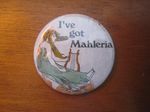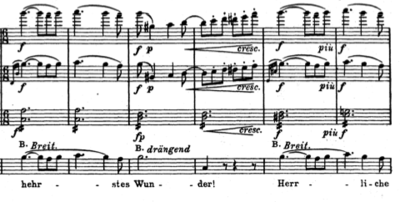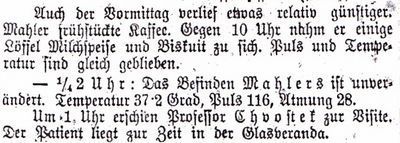Alex Ross's Blog, page 232
May 23, 2011
Dylan on Dylan
"I take [my work] less seriously than anybody. I know that it's not going to help me into heaven one little bit, man. It's not going to get me out of the fiery furnace. It's certainly not going to extend my life any and it's not going to make me happy."
— from a remarkable interview with Robert Shelton in 1966
May 21, 2011
Raphaël Cendo
The Belgian percussionist Tom De Cock plays Raphaël Cendo's 2002 work scratch data. I came upon this video after listening to Cendo's rigorously alarming piece Introduction aux ténèbres, a setting of texts from the Book of Revelation, on the NEOS CD Donaueschinger Musiktage 2009 (vol. 2). At a CDMC conference in 2008, Cendo joined Franck Bedrossian and others in discussing issues of excess, saturation, monstrosity, chaos, mutilation, and, naturally, black metal. Introduction aux ténèbres partakes of such bitter fruit; scratch data finds the composer in a much more lyrical mood.
A Dylan list
Outside Hibbing, Minnesota, 1998.
The seventieth birthday of Mr. Bob Dylan arrives on Tuesday. I'm not sure I have a great deal to add to what I wrote in The New Yorker back in 1999 — the essay appears in my book Listen to This — but I thought I'd offer a quirky, highly personal playlist of fifteen Dylan recordings I cannot live without, in versions that may or may not be commercially available. I wonder if the mysterious bard will ever agree to release the original Blood on the Tracks, which is his masterpiece.
1. Tangled Up in Blue
2. Simple Twist of Fate
3. You're a Big Girl Now
4. Idiot Wind [tracks 1-4 from Blood on the Tracks test pressing]
5. Freeze Out (aka Visions of Johanna, rec. November 1965 w/ The Hawks)
6. Baby Let Me Follow You Down (live in Manchester, 1966)
7. Sad-Eyed Lady of the Lowlands
8. Million Dollar Bash (take 1 from the Basement Tapes)
9. Sign on the Cross
10. Abandoned Love (live at the Bitter End, 1975)
11. The Groom's Still Waiting at the Altar (live at the Fox Warfield, 1980, w/ Michael Bloomfield)
12. Blind Willie McTell
13. Not Dark Yet
14. The Lonesome Death of Hattie Carroll (live at the El Rey Theatre, 1997)
15. Ain't Talkin'
Dylan list
Outside Hibbing, Minnesota, 1998.
The seventieth birthday of Mr. Bob Dylan arrives on Tuesday. I'm not sure I have a great more to say on the subject right at the moment — a long essay on Dylan appears in my book Listen to This — but I thought I'd offer a quirky, highly personal playlist of fifteen Dylan songs I can't live without, in versions that may or may not be commercially available:
1. Tangled Up in Blue (original New York version)
2. Simple Twist of Fate
3. You're a Big Girl Now (original New York version)
4. Idiot Wind (original verson)
5. Freeze Out (original version of "Visions of Johanna" w/ The Hawks)
6. Baby Let Me Follow You Down (live in Manchester, 1966)
7. Sad-Eyed Lady of the Lowlands
8. Million Dollar Bash (take 1 from the complete Basement Tapes)
9. Sign on the Cross
10. Abandoned Love (live at the Bitter End, 1975)
11. The Groom's Still Waiting at the Altar (live at the Fox Warfield, 1980, w/ Michael Bloomfield)
12. Blind Willie McTell
13. Not Dark Yet
14. The Lonesome Death of Hattie Carroll (live at the El Rey Theater, 1997)
15. Ain't Talkin'
May 19, 2011
Herrliche or herrlichste?
An interesting fact-checking question arose when I was finishing up my recent piece on Wagner's Walküre. Published sources disagreed about the exact wording of a crucial line that Sieglinde sings in Act III, when she hails Brünnhilde as the savior of her yet-to-be-born child Siegfried: "O hehrstes Wunder! Herrliche Maid!" ("O noblest wonder! Glorious woman!") That's what it says in the full score, but quite a few reputable books make it "Herrlichste Maid!" ("Most glorious woman!") — and so do many famous sopranos on record. What gives? Madeleine Baverstam, the fact-checker, and I contacted several authorities, including the Wagner archive in Bayreuth, and the answer came back: "Herrliche" is correct. Wagner had it that way when he first published his Ring libretto, in a private printing in 1853. (There it says, "Du hehrstes Wunder! herrliche Maid!") But when the composer wrote out the first draft of Walküre, he either changed his mind or made a slip of the pen, and it became "Herrlichste." Karl Klindworth used that draft to make the vocal score of the opera, and his reduction remains in circulation. Wagner reverted to "Herrliche" when he made a fair copy of the full score, as the critical report in the Wagner Gesamtausgabe observes, and the first published score faithfully followed him (although it contains many other errors, as the conductor Simone Young pointed out to me when we spoke).
How much difference does a superlative make? Not a great deal, perhaps: the essential import remains the same. Yet substituting "Herrliche" for "Herrlichste" might slightly ease the life of the working singer, since the latter is more of a mouthful. Maybe that's why Wagner chose it in the end. In any case, I'll take any excuse to zero in on this tremendous moment. The great wheeling melody that is here introduced will return only at the very end of the Ring, in the final minutes of Götterdämmerung: over it Brünnhilde sings the words "Feel how my breast also burns," and it soars in the violins in the closing bars. There has long been a certain controversy around Wagner's decision to finish the saga with so luxurious a theme. George Bernard Shaw, the unsentimental Wagnerite, found it cheap and retrogressive, like the entire opera. (He once proposed the alternative title Götterdämmerung: or, The Relapse of the Teetotaler.) For me, it communicates the sense of innocence, of atavistic human hope, that Wagner allows amid his apocalypse. It might not have that effect if it were heard more often — its power resides in the fact that Wagner holds it back.
In Walküre, the melody always seems to have the effect of an abrupt illumination, of light flooding in. When a singer as secure as the young Deborah Voigt delivers it, you are lifted out of your seat. The excerpt I've chosen above is from a legendary Met performance on Dec. 6, 1941, with Astrid Varnay as Sieglinde and Erich Leinsdorf conducting. The almighty dramatic soprano was then only twenty-three, and, incredibly, she was making her first appearance on any stage, substituting on one day's notice for Lotte Lehmann. (As Varnay related in her fabulous memoir Fifty-five Years in Five Acts, the following day her brother went out in search of reviews, and came back with news of the attack on Pearl Harbor.) The sense of personal and artistic triumph in the voice is palpable. In several senses, you hear the future.
May 18, 2011
For Gustav Mahler

...A man got into the carriage and began to play on a fiddle made apparently of an old blacking-box, and though I am quite unmusical the sounds filled me with the strangest emotions. I seemed to hear a voice of lamentation out of the Golden Age. It told me that we are imperfect, incomplete, and no more like a beautiful woven web, but like a bundle of cords knotted together and flung into a corner. It said that the world was once all perfect and kindly, and that still the kindly and perfect world existed, but buried like a mass of roses under many spadefuls of earth....It said that with us the beautiful are not clever and the clever are not beautiful, and that the best of our moments are marred by a little vulgarity, or by a needle-prick out of sad recollection, and that the fiddle must ever lament about it all. It said that if only they who live in the Golden Age could die we might be happy, for the sad voices would be still; but they must sing and we must weep until the eternal gates swing open.
— W. B. Yeats, "The Golden Age"
May 17, 2011
Video of the day
The Danish composer Pelle Gudmundsen-Holmgreen dances to his own music. (Via The Rambler.) As this video strongly hints, Gudmunsden-Holmgreen is a wildly unpredictable composer with a flair for the absurd. I've long been a fan of his Symphony-Antiphony, a masterpiece of polystylism, and I've lately been trying to wrap my head around his darkly ecstatic piano concerto Plateaux, which ends with a Mozart hallucination.
Mahler online
 If, as in provincial New York, there are no live Mahler events in your town on the anniversary of his death, the Internet is ready to pick up the slack. Medici.tv is offering the complete symphonies with the Orchestre de Paris under Christoph Eschenbach. (Free with registration.) Arte will provide live webcasts from the Mahler Festival in Leipzig, with performances by the Gewandhaus Orchestra, the Vienna Philharmonic, the New York Phil, the Dresden Staatskapelle, the London Symphony, the Zurich Tonhalle, the Mahler Chamber Orchestra, the Bavarian Radio Symphony, and the MDR Symphony. (A morning concert with the Concertgebouw is omitted.) And for ten euros you can buy access to the Berlin Philharmonic's special concert under the baton of Claudio Abbado, with Anne Sofie von Otter and Jonas Kaufmann singing Das Lied von der Erde.
If, as in provincial New York, there are no live Mahler events in your town on the anniversary of his death, the Internet is ready to pick up the slack. Medici.tv is offering the complete symphonies with the Orchestre de Paris under Christoph Eschenbach. (Free with registration.) Arte will provide live webcasts from the Mahler Festival in Leipzig, with performances by the Gewandhaus Orchestra, the Vienna Philharmonic, the New York Phil, the Dresden Staatskapelle, the London Symphony, the Zurich Tonhalle, the Mahler Chamber Orchestra, the Bavarian Radio Symphony, and the MDR Symphony. (A morning concert with the Concertgebouw is omitted.) And for ten euros you can buy access to the Berlin Philharmonic's special concert under the baton of Claudio Abbado, with Anne Sofie von Otter and Jonas Kaufmann singing Das Lied von der Erde.
May 15, 2011
From Mahler to Monk
As most everyone knows, the centenary of the death of Gustav Mahler falls next Wednesday. Gavin Plumley has been counting down the days to the lamentable anniversary by chronicling the final stages of Mahler's illness, which was reported in the press in extraordinary detail. (The above, noting his temperature, pulse, and diet on May 17, 1911, comes from the Neue Freie Presse of Vienna.) In the city where he breathed his last, the Vienna Philharmonic will play the Ninth Symphony in a special concert at the Staatsoper. In Leipzig, in the midst of a festival of the complete symphonies, Riccardo Chailly will lead the Second. The Berlin Philharmonic, under Claudio Abbado, performs the Adagio of the Tenth and Das Lied von der Erde. In Dresden, Esa-Pekka Salonen conducts the Third. In London, the Royal Academy of Music surveys the complete songs. And in Boulder, Colorado, the annual MahlerFest kicks off with a Lieder recital. There are also commemorative concerts in Amsterdam, Bonn, Canberra, Duisburg, the Hague, Hamburg, Lisbon, London, Lucerne, Munich, and Prague, among other places. Meanwhile, in New York, where Mahler conducted his final concert, we have ... nothing. I can find no trace of his music being performed here on May 18. (The NY Phil is playing Mahler this week, but they're on tour in Europe. The New Jersey Symphony does the Third next weekend.) Seltsam! Maybe it's fitting, though, that the most notable musical event in the city that day is a WNYC concert marking the release of Meredith Monk's Songs of Ascension on CD. This work, which I wrote about in 2009, has little in common with Mahler, yet its mission of transcendence is one that he might approved. Monk: her time has come.
Previously: Endless Mahler, Mahlermania, Mahler graffiti, Mahler on the beach, Mahler grooves, Mahler 150.
May 14, 2011
Desecration rags
A Noise reader draws attention to another odd gem in the Library of Congress Jukebox: Felix Arndt's Operatic Nightmare, containing quotations from Wagner, Verdi, and various others. (Not all are listed in the notes to the recording; that's a bit from Act III of Walküre right at the start.) Arndt's Desecration Rag is also worth a listen. Read more about Arndt here.
Alex Ross's Blog
- Alex Ross's profile
- 425 followers






